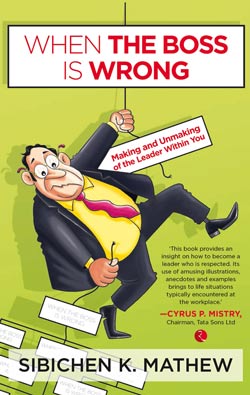 Leadership, anyone?
Leadership, anyone?
Published by: Rupa Publications
ISBN: 978-8129136824
Pages: 288
Price: INR 295
Almost the entire literature in the area of leadership and management tends to focus on the performance and the efficiency of managers. Sibichen Mathew is of the opinion that “true learning can take place not by looking at the right traits, but by analysing the wrong ones.” Thus was born the premise for When the Boss is Wrong, which contains 50 different dimensions of bad leadership and their ramifications for people and organisations.
Sibichen’s aim with this “systematic inquiry” has been to create unique prescriptions for “wrong” bosses, and solutions for their “suffering” subordinates. Using researches and studies exemplify the findings that Sibichen himself gathered over years of experience—through interviewing well-known company heads, questionnaires about bosses and observing behaviours in his own workplace. What results is a study dotted with real life anecdotes and cutting across many kinds of workplaces.
When the boss is wrong is both informative as well as enjoyable at the same time.
In a chapter, “Mr Boss, you are petty!”, Sibichen lists out revealing responses of middle-level managers who were asked why their boss is petty. The answers ring a bell and make you want to try the prescriptions, instantly!
“Coping with a young boss” and “Coping with an old boss”—two chapters that emphasise on how a tectonic shift in working style [between generations] may wreck the boats of senior employees’ or bust the myth that seniority assures wisdom.
Perhaps, the most humorous idea in the book is the one that shows how stages similar to the “ashrams” can be seen in the professional lives of many people, often detrimental to the organisation. After all, how much good can a boss, who is in a state of nirvana after losing his young “fizz” over two decades, do? “Which animal are you and your boss?” will make you smile, before making you feel not-so-flattered.
While most of the book throws at you unique ideas and experiences of working professionals, some [though not any less significant] may not be unheard of. Sibichen begins with how you could have absorbed some of the personality traits of your boss and goes on to talk about “Runaway Bosses” and “Snoopervisors”, those low on EQ or high on “ditching ethics”. You will be encouraged to do a thorough self-examination!
The lessons at the end of each chapter are prescriptions for the bosses, precautions for the employees and precepts for the organisation. Some deserve heeding, like–to remember that “you leave a trail of whatever you do in the organisation”, “images that are bought, never match images which are gained through excellence” and “the courage and preparedness to unlearn is a necessary prerequisite for creativity”.
Mostly, the lessons are simplistic and commonsensical. The ones that contain interviews of top bosses of well-known organisations, tests to take [like the one that checks how much your present boss knows you] or boxes with questions to ponder upon are interesting.
When the Boss is Wrong is a long book. Some chapters overlap. Some ideas may confuse too. For instance, Narcissism and Authoritarianism are otherwise seen as negative traits but are “excused” in a chapter which discusses essential traits of “Messiah Bosses”. The “signs of recovery” of an organisation after suffering at the hands of any kind of a bad boss are the same across all chapters.
Underlying the narrative of the book appears a picture of a good boss—who telephones all the employees when a bomb blast occurs in a city, or who credits the team before his own managerial skills. And overarching this exercise is a question for all bosses—how many of you really care about what others think of you? While the bosses think it over, all you can do is “make your bosses smile with your smile”, especially if, in your organisation, “no good work goes unpunished”.
This was first published in the October 2015 issue of Complete Wellbeing.

